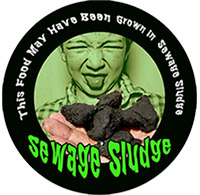Portal:Toxic Sludge/Breaking News
Under Pressure, Whole Foods Agrees to Stop Selling Produce Grown in Sewage Sludge
The Center for Media and Democracy (CMD) broke the story that the $12.9 billion-a-year natural and organic foods retailer Whole Foods Market had a policy of "don't ask, don't tell" when it comes to "conventional" -- or non-organic -- produce being grown in fields spread with sewage sludge, euphemistically called "biosolids." Certified organic produce cannot be fertilized with sewage sludge, which is the industrial and hospital waste and human excrement flushed down the drains and later -- in some cases -- spread on some crops.
Since this story broke, nearly 8,000 activists and PRWatch readers have sent emails to Whole Foods executives asking the company to require its suppliers to disclose this information and to label produce grown in sewage sludge so that customers can make informed decisions.
Mario Ciasulli, a semi-retired engineer and home cook living in North Carolina whom CMD profiled in December 2012, blew the whistle on Whole Foods' don't-ask, don't-tell policy. As soon as he found out that shopping at Whole Foods was no protection against this potential contamination unless he could afford to buy only certified organic produce, he worked extensively to engage Whole Foods on this issue. He has insisted that management address his concerns about potential contamination of non-organic produce, price barriers to organic produce for those who are concerned, and the difficulty of finding out what non-organic produce may have been grown in soil fertilized with sewage sludge without labeling and accountability.
In late 2013, Whole Foods announced a new set of standards for the fresh produce and flowers it sells. Sewage sludge was not mentioned in the announcement, but Ciasulli received word from the company that "[p]rohibiting the use of biosolids will be part of our core requirements. All of our suppliers will be compliant with the core requirements by the time we roll out the program." A follow-up email to Ciasulli indicated, "This initial release was meant to be high-level. There are far too many nuances to include on a press release."
This month, Whole Foods Market spokesperson Kate Lowery confirmed to CMD that the new standards will eventually prohibit the use of "biosolids." . . .
You can thank Whole Foods for listening to Mario and other concerned customers, ask Whole Foods to make this announcement public, and tell the company that you'll be watching to see that these changes are made HERE.
Read more from CMD's PRWatch here.
